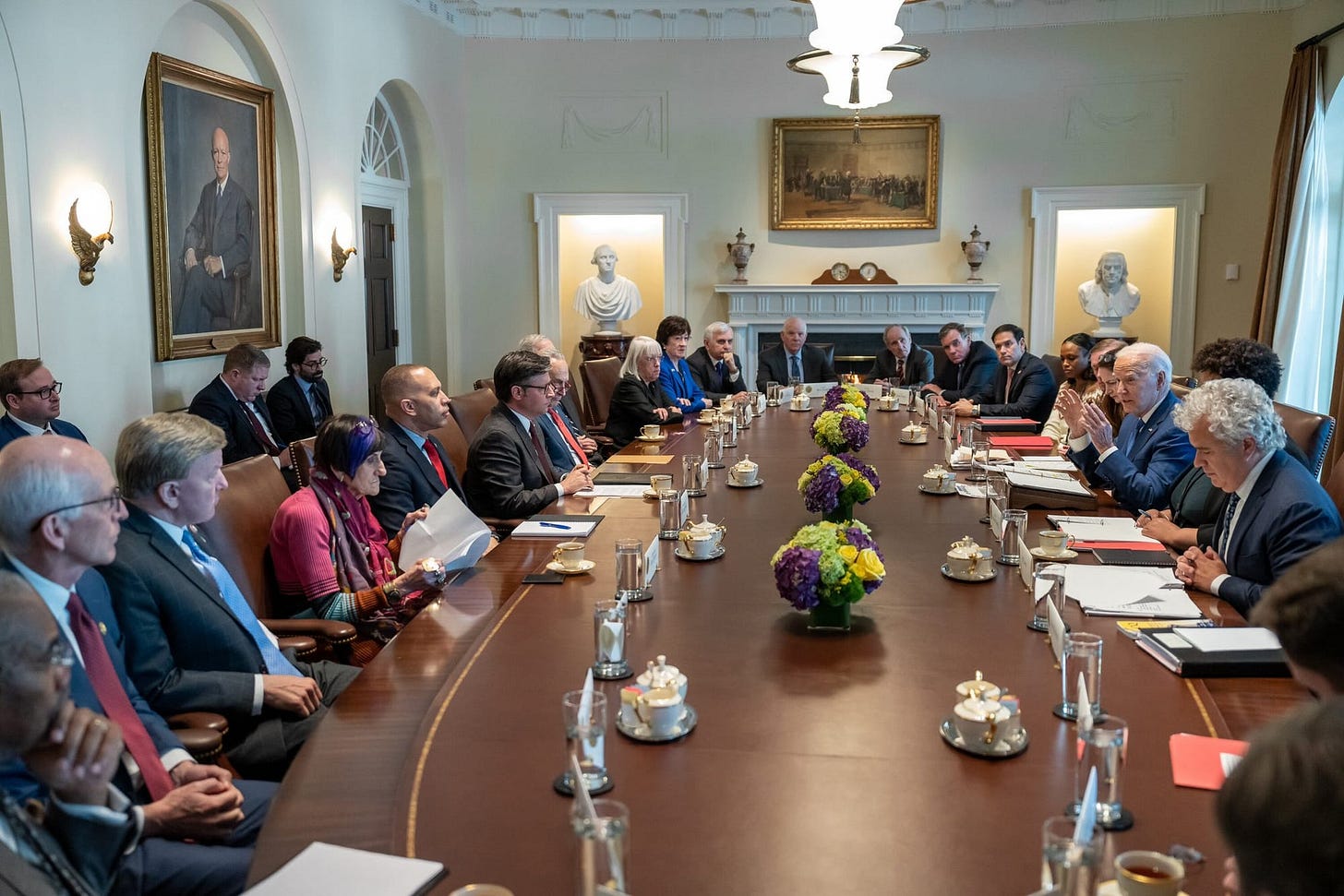Why Biden needs a border deal
As migrant crossings surge, President Biden is pushing lawmakers to strike a deal on border security and Ukraine aid.

Good morning! It’s Thursday, January 18, 2024. Election Day is 292 days away. If this newsletter was forwarded to you, subscribe here. If you want to contribute to support my work, donate here.
Ukraine aid has been one of the thorniest political issues of the last two years. Border security has been one of the thorniest political issues of the last two decades. Only in Washington would anyone think tethering the two together might make it easier to pass them, instead of just making both even more complicated.
As negotiators zero in on such a deal, President Biden summoned congressional leaders to the White House on Wednesday to make his final pitch, urging lawmakers to quickly pass the package once it’s completed. Attendees from the House and Senate had very different responses.
House vs. Senate
In the Senate, the proposal — which is expected to pair aid for Ukraine and Israel with new measures to heighten border security — appears on track for speedy passage.
“For the first time, I think the chances of getting it done in the Senate are greater than not getting it done,” Senate Majority Leader Chuck Schumer (D-NY) said after he emerged from the White House. His Republican counterpart, Senate Minority Leader Mitch McConnell (R-KY) — one of the leading GOP proponents of Ukraine aid — approvingly told reporters that a vote could come as soon as next week.
On the House side, though, Speaker Mike Johnson (R-LA) — a neophyte negotiator who is faced with navigating a razor-thin majority — has repeatedly waffled on whether he would accept a deal.
In a conference call over the weekend, according to Punchbowl News, Johnson told House Republicans that the final package must include H.R. 2, the House-passed bill that would resume construction of a border wall, strictly limit the asylum process, and reinstate migrant family detention. (All of these policies are non-starters among Democrats.)
However, per the Associated Press, the speaker did not draw so strict a red line during the White House meeting. “We’re not insistent upon a particular name of a piece of legislation, but we are insistent that the elements have to be meaningful,” Johnson told reporters after exiting.
Then, in a Fox News interview later in the day, Johnson again seemed to signal the path forward for a deal is rocky. When host Laura Ingraham told him that former President Donald Trump opposes the forthcoming package, Johnson replied: “President Trump is not wrong. He and I have been talking about this pretty frequently.”
For Johnson, even if a Ukraine/border bill passes the Senate next week, putting it to a vote on the House floor could be fatal for his job prospects. Rep. Marjorie Taylor Greene (R-GA) has threatened to trigger a vote on ousting Johnson if he accepts any deal that includes Ukraine funding, no matter the immigration provisions.
Speaking to reporters, McConnell dismissed the gap between Republicans in the two chambers. “It’s not unusual for the House and Senate to be in a different place,” the Senate GOP leaders said. “I don’t know what the House will do.”
Biden’s calculus
During yesterday’s meeting, Biden reportedly focused on the Ukraine half of the negotiations: per the AP, his aides walked lawmakers through what would happen to Ukraine month-by-month if the country did not receive new support from the U.S.
But, for Biden, the border security component is the more urgent political problem. 63% of Americans said in a recent CBS News/YouGov poll that his administration should make it harder for migrants to cross the border, up from 55% who said the same in September.
In the same poll, 45% said the situation at the U.S.-Mexico border is now a crisis, up from 38% in May. In December, U.S. Border Patrol agents arrested more than 225,000 migrants attempting to illegally cross the border, the most of any month in the agency’s history.
As local shelters overflow with migrants, testing state and city budgets, a series of Democratic mayors and governors have called on Biden to tighten control of the border, joining Republican officials. Yesterday, when the House voted on a non-binding resolution that described the Biden administration as promoting “open-borders policies,” 14 Democrats offered their support.
Democratic pressure has made the issue harder for Biden to ignore, providing the first change in years to the congressional calculus on border negotiations. Traditionally, such talks have focused on pairing heightened border security with a pathway to citizenship for undocumented immigrants currently in America. But the appearance of a new bargaining chip — Ukraine aid — and a new Democratic desire to clamp down on the border, even without an accompanying pathway to citizenship, has the potential to break the logjam.
Republican senators have argued to their House colleagues that the stars won’t align in this same way again, making it imperative that they accept a deal now — rather than wait in the hopes that they will get a better agreement next year under a potential Republican trifecta.
“There is absolutely no way that we would get the kind of border policy that’s being talked about right now with a Republican majority in the Senate,” Sen. John Thune (R-SD) said, according to Punchbowl, arguing that Democrats would filibuster this same package with Donald Trump in the White House. “This is a unique moment in time.”
Without a deal, President Biden would enter election season having failed to enact one of his top political priorities (Ukraine aid) while also doing little to change America’s dismal views of his border program. If the agreement does not get past the GOP-led House, Biden has signaled willingness to turn to executive action to address the border, further shifting his posture as the crisis worsens.
“I’m hopeful. I’m going to let those negotiations play out,” he recently told reporters. “But other than that, I’m going to take action myself.”
More news to know.
* During oral arguments on Wednesday, Supreme Court conservatives seemed prepared to roll back Chevron deference, the decades-old legal precedent that largely gives federal agencies leeway to create policies and regulations.
* A New York federal judge threatened to eject Donald Trump from his Manhattan civil trial on Wednesday after Trump repeatedly spoke aloud while E. Jean Carroll, who is suing him for defamation, testified. “You just can’t control yourself in these circumstances, apparently,” Judge Louis Kaplan, a Clinton appointee, said. “You can’t either,” Trump responded.
* Ron DeSantis’ super PAC is carrying out layoffs as his campaign seeks to recover from a distant second-place finish in Iowa.
* Trump’s campaign is continuing to focus on vengeance as it seeks to complete the ex-president’s takeover of the GOP. Trump aides are reportedly encouraging a primary challenge to Virginia Rep. Bob Good, the chair of the House Freedom Caucus, and telling allies not to work with prominent Republican operative Jeff Roe, after both Good and Roe endorsed DeSantis.
* Rep. Nancy Mace (R-SC) may face a primary challenge from her own former chief of staff.
The day ahead.
At the White House: President Biden will travel to Raleigh, North Carolina, to deliver a speech promoting his economic agenda. Vice President Harris will participate in a moderated conversation on gun violence prevention at the U.S. Conference of Mayors’ Winter Meeting.
On the Hill: The Senate will vote on passage of the continuing resolution extending government funding through March 1 for foru appropriations bills and through March 8 for the remaining eight appropriations bills. The CR advanced in a bipartisan 68-13 vote on Tuesday.
The House will vote on the Supporting Pregnant and Parenting Women and Families Act, which would block a proposed Biden administration rule that would restrict federal funds from going to “crisis pregnancy centers,” facilities which discourage patients from obtaining abortions. The chamber may also vote on the CR under suspension of the rules, which requires two-thirds support.
On the committee level, the House Homeland Security Committee will hold its second impeachment hearing on Homeland Security Secretary Alejandro Mayorkas. Arizona sheriff Mark Dannels and Tammy Nobles, whose daughter was allegedly killed by an MS-13 gang member.
At the Supreme Court: The justices don’t have any oral arguments today.
Thanks for reading.
I get up each morning to write Wake Up To Politics because I’m committed to offering an independent and reliable news source that helps you navigate our political system and understand what’s going on in government.
The newsletter is completely free and ad-free — but if you appreciate the work that goes into it, here’s how you can help:
Donate to support my work or set up a recurring donation (akin to a regular subscription to another news outlet).
Buy some WUTP merchandise to show off your support (and score a cool mug or hoodie in the process!)
Tell your family, friends, and colleagues to sign up at wakeuptopolitics.com. Every forward helps!
If you have any questions or feedback, feel free to email me: my inbox is always open.
Thanks so much for waking up to politics! Have a great day.
— Gabe




